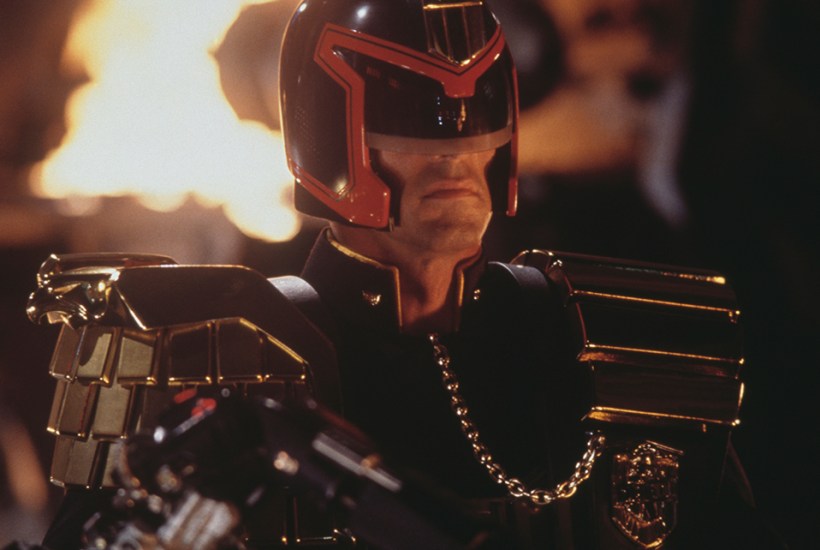In 1977, an enduring character was created for the pages of the IPC comic 2000 AD: Judge Dredd, lawman of the future, the most visible symbol of police procedure – a helmeted, black-clad, motorbike-riding policeman patrolling the streets of Mega-City One, a vast metropolis stretching along the eastern coast of the US, whose remit also allows him – as his honorific implies – to be an on-the-spot judge, jury and, when the occasion demands, executioner. The occasion often demands it.
It is interesting that the two longest- running human cartoon characters in Great Britain represent opposite poles of the psyche. Their names both begin with D, for some reason or none. Dennis the Menace is all about anarchy; Dredd very much not so. His catchphrase, ‘I am the Law’, emphasises his nature as symbol, as figurehead: in the 46 years of his duties, we have never seen his face.
Originally not much more than a tough guy, he quickly became a complex character, the hero/anti-hero of a story in which individual liberty is pitted against the forces of authority. No crime is too small to escape prosecution. Sometimes you don’t even have to commit a crime. In 1995, a one-off strip appeared, featuring a blameless citizen called Eric Spendpenny who is desperate to find a public toilet. His urgency is reported. ‘The reader knows,’ writes Michael Molcher, ‘that Spendpenny is already doomed.’ (He ends up being sentenced for littering.)
I cannot recall a more timely book, with Rishi Sunak having recently announced a new policing initiative, ‘Immediate Justice’, in which petty criminals caught in the act would be forced to pay some form of restitution and penance. Its details remain vague, but I have no doubt that many people are wholly sympathetic to this, and to the idea of Dredd tout court. Keir Starmer’s objections are muted, if they exist at all. It is a vote-winner, except among milquetoast liberals like me.
Yet I devoured Judge Dredd weekly for 30 years since the character’s creation, for the extremely witty, incisive scripts, mainly by John Wagner, and a whole array of excellent artists, notably the Spaniard, Carlos Ezquerra, Dredd’s first illustrator. Wagner, naturally anti-authoritarian, intended to see how much of a ‘bastard’ he could get away with making Judge Dredd; and the longest-running tacit gag in the strip is the degree of a population’s acceptance of their own repression. Apart from the occasional luckless citizen such as Spendpenny, the people of Mega-City One, driven mad by almost total unemployment and the general mania induced by the mores of the future, are by no means blameless, subject to either spasms of criminality or outbreaks of lunatic crazes in order to relieve the meaninglessness.
Science fiction is generally seen as an extrapolation of the present, and this book demonstrates that in abundance, with the difference being that, according to Molcher, we are now already at the point at which our own policing methods are identical, or directly equivalent, to those of Mega-City One’s justice department. In some respects, we passed the point of equivalence some time ago. This is how Molcher’s book works: here is an episode or a storyline from Judge Dredd; and here is a closely related example of police practice. It can feel repetitive over 360 pages, but Molcher does not actually repeat himself; it is simply that there is so much material. His footnotes, citing reports into criminal justice, run into the hundreds. This is not just a celebration of the future fictional character: it is a thoughtful, and often alarming examination of the state of law enforcement in a liberal, or neo-liberal, society.
Which is complex. There are times when even wets have to root for Dredd. He is more than some gun-toting Terminator in a police uniform. His dedication to the law is more than just lip-service; and, besides, his faceless authoritarianism is the ideal foil for some highly comic situations. I remember one episode in which a criminal – or ‘perp’ – hijacks an express subway train and fires a weapon which turns the passengers into drooling idiots. Dredd boards the train and says: ‘Drokk! Tube’s full of morons!’ (‘Drokk’ is a swear word invented by Wagner, intended as an innocent replacement for a more familiar one also ending in a back-voiced uvular fricative.) I think of this every time I get into the crowded Underground. After nearly 50 years of adventures, there are countless more examples of this, and Molcher can’t really do them (so to speak) justice. Nevertheless, this is an eye-opening book.
Got something to add? Join the discussion and comment below.
Get 10 issues for just $10
Subscribe to The Spectator Australia today for the next 10 magazine issues, plus full online access, for just $10.
You might disagree with half of it, but you’ll enjoy reading all of it. Try your first month for free, then just $2 a week for the remainder of your first year.








Comments
Don't miss out
Join the conversation with other Spectator Australia readers. Subscribe to leave a comment.
SUBSCRIBEAlready a subscriber? Log in